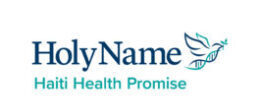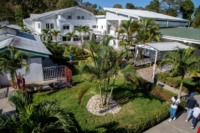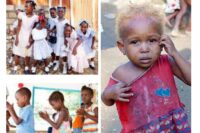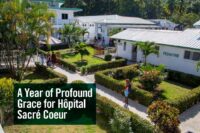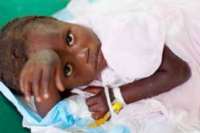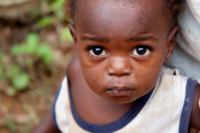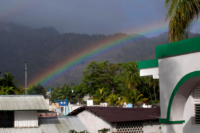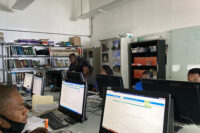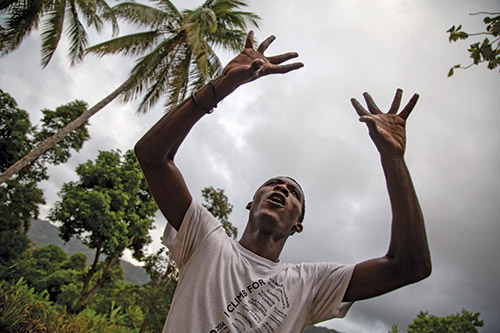 By Tim Traynor, CRUDEM Facilities Advisor
By Tim Traynor, CRUDEM Facilities Advisor
Everything in this world must be viewed in a context, especially those situations that affect our daily lives. We often struggle to meet our personal obligations like, car or mortgage payments, making time to spend with family and friends and finding flashes of solitude to speak with the Creator. We struggle with street traffic and those incessant lines at the airport, grocery store and sporting events. We struggle with career decisions, the fulfillment of dreams and, sometimes, a bitter disappointment.
And then there is that down time when we are out of synch with our surroundings. In truth, we spend a good deal of time carefully navigating the shoals of a seemly perpetual life. Occasionally, life’s counterpoint avails the grace God bestows upon us in serendipitous moments of good fortune or the unexpected tick that lifts us into a better place. If we pause and take stock, we are most often pleased with things in general; which is not to say that things couldn’t be better, but for the most part, we are just fine. It is a good life.
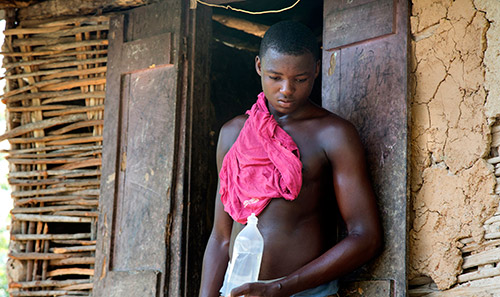 Some of my friends aren’t doing so well by my standards of having that good life. As a matter of fact, I have many friends that fall into that unfortunate category. These aren’t the people who live next door or even those that I see occasionally at church or in social circles where those situations mentioned above apply. These are the people that I know in Haiti, particularly those who live in Milot, in and around Sacré Coeur Hospital.
Some of my friends aren’t doing so well by my standards of having that good life. As a matter of fact, I have many friends that fall into that unfortunate category. These aren’t the people who live next door or even those that I see occasionally at church or in social circles where those situations mentioned above apply. These are the people that I know in Haiti, particularly those who live in Milot, in and around Sacré Coeur Hospital.
I see them struggle mightily each day to get to work, taking tap taps — jalopies really — over dusty and cratered roads, often to earn only a few dollars per day. I hear the chatter between them, when they don’t know I am listening, revealing the obstacles that life throws at them: not enough money for lunch or even dinner, a broken shoe or a sick child. I am present during their tragedies and their losses, when they can no longer hold back the tears. But in the context of this difficult place, I have come to realize that my Haitian friends are probably happier in their lot than many of my friends are back in the US and they feel this despite the impoverished existence in which they live.
When it rains here in Haiti, people get wet and I am not just talking about that dash from the office to your car kind of wet. I am talking soaking wet, to the bone, in their long walks from school, church or the local well to their often ramshackle, damp, unlit shanties made of rusty tin, discarded cardboard and plastic wrapping. They don’t jump into a hot shower and blow dry their coiffed hair, then slip into a warm terry cloth robe and enjoy a cup of hot tea. They likely shiver in place until the rain stops and sun can dry out the rags they have on their backs. Yet they are generally happy people.
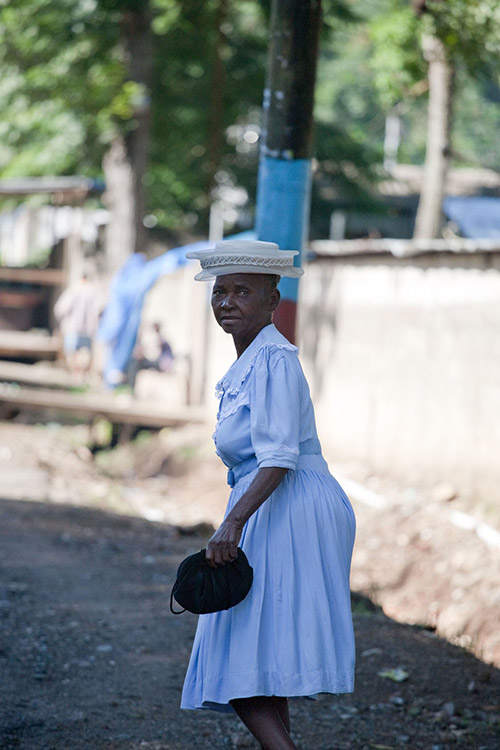 From the mountain top, Jesus said, “Blessed be the poor in spirit: the kingdom of heaven is theirs.” I know he wasn’t talking about my Haitian friends. For despite all of their material poverty, they are blessed with an abundance of good spirit and a lightness of being.
From the mountain top, Jesus said, “Blessed be the poor in spirit: the kingdom of heaven is theirs.” I know he wasn’t talking about my Haitian friends. For despite all of their material poverty, they are blessed with an abundance of good spirit and a lightness of being.
A better Beatitude for them would be: “Blessed be the pure in heart: for they will see God.”
They bear their plight with resiliency. I see this in their faces when they queue up in one of those endless lines that course its way out past the iron gate at the front of the hospital and down the street to our little hospital in the valley. They wait patiently with bundles wrapped in old, tattered sheets, not the latest Briggs and Riley luggage. They are dressed with the best clothes that they own and will present themselves to our nurses and doctors, as clean and shiny as the cold mountain stream or wellhead can provide. They are not so poor in spirit that they have their heads down and take their situation as one of loss or defeat but rather they walk with a spring in their step and hold themselves erect with pride and resolve.
A line in our hospital to them is not a frustration but a path to urgent care to relieve unattended symptoms and often implacable pain.
Some look into my eyes and greet my gaze with a smile and in that instant they tell me without words that they are going to be ok because I am here. They invest so much trust in our mission to save them from the extraordinary maladies and circumstances that this little island nation filled with suffering and neglect can throw at them.
Yes, you know well about the terrible tragedy of the earthquake, the occasional hurricane which blows families into the sea and those third world scourges like cholera which took the lives of entire families within days of falling ill. It is true that our roads are broken, we don’t have electricity in much of the land, food is a currency that few can afford on any regular basis and healthcare is sporadically available to those with the temerity to make long journeys on foot or in overcrowded tap-taps despite being deathly ill.
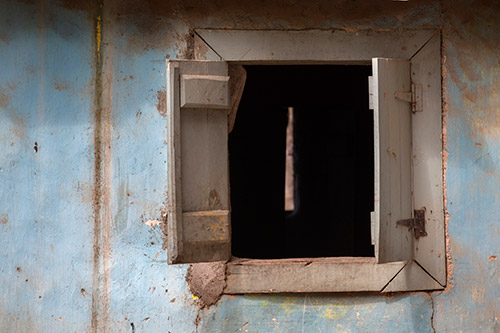 But these are not a people to be easily daunted by such strong winds of misfortune. They are unbending in their fight to survive despite the loss of another child or the empty spot under the tree where their mother used to sit and sing to them.
But these are not a people to be easily daunted by such strong winds of misfortune. They are unbending in their fight to survive despite the loss of another child or the empty spot under the tree where their mother used to sit and sing to them.
I know this all sounds too bleak to imagine and I know that many of my US friends may find the context too difficult to relate to because their lives are rarely touched by such images and realities. And let’s not forget all those rumors and truisms about Haiti and its poor governance, missing money and failed attempts to “fix” the very things I have described herein. Unfortunately, it is all too true.
So why should I help and what is so special about CRUDEM and its “petite hopitâl” in the valley? Good questions and here is an answer, at least my viewpoint of one, because what we are doing in Milot is working.
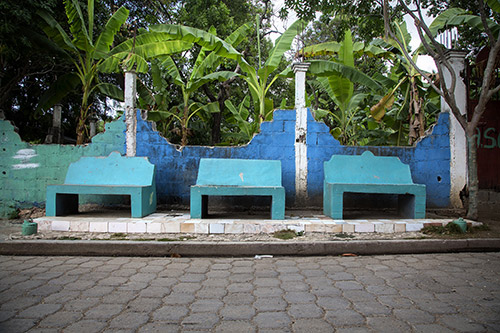 We Americans know how good we have it. We watch CNN and the nightly network news and hear what is going on in places like Haiti, Syria, the Ukraine and dozens of other remote and miserable places. We know we have good lives. We were raised by parents and a society that values sharing our good fortune and the charity such places cannot survive without. But…we are also consumers raised in an environment the respects a good deal, a sale that is too tempting to pass up, a discount that says, “take advantage of this opportunity.”
We Americans know how good we have it. We watch CNN and the nightly network news and hear what is going on in places like Haiti, Syria, the Ukraine and dozens of other remote and miserable places. We know we have good lives. We were raised by parents and a society that values sharing our good fortune and the charity such places cannot survive without. But…we are also consumers raised in an environment the respects a good deal, a sale that is too tempting to pass up, a discount that says, “take advantage of this opportunity.”
I happen to believe that Hopitâl Sacré Coeur is the best deal going out there. Well, at least out there in Haiti. In the States, we get inundated with requests for help or support from dozens of organizations that have good stories to tell and needs much like those I described here in. They share with us telling photos which glimpse into that need and hope that you will be moved by such sights to continue your support or get into the game.
So why give to CRUDEM? Because it is more than a donor opportunity: It is an idea and an approach that differs in a very significant way from other care delivery portals.
We want to build from within, to advise and support the mission started by those good men 35 years ago, the Brothers of the Sacréd Heart. We teach how to work better and more efficiently. We provide meaningful employment and we create strong and complimenting synergies which radiate out from our hospital into the greater community. Aside from the obvious benefits of an effective health care program, we provide the dignity of work for men who really do want to take care of their families’ obligations, the empowerment of women who otherwise would be marginalized by their poverty and the imbuing hope that Haitians are not a discarded people, too small to be seen in a world of surplus and the pursuit of more.
CRUDEM is unique because 100% of every dollar donated goes into the hospital as direct aid without the burden of overhead or expenses that dilutes the effort that many organizations are subject to. This is done through the generosity of a single sponsor who underwrites the cost of running the operations and understands the power that such a pledge to our donors represents.
Through its commitment to stewardship and transparency, CRUDEM ensures that your investment in Hôpital Sacré Coeur is applied to infrastructure, training and technology to yield returns uncommon elsewhere in Haiti.
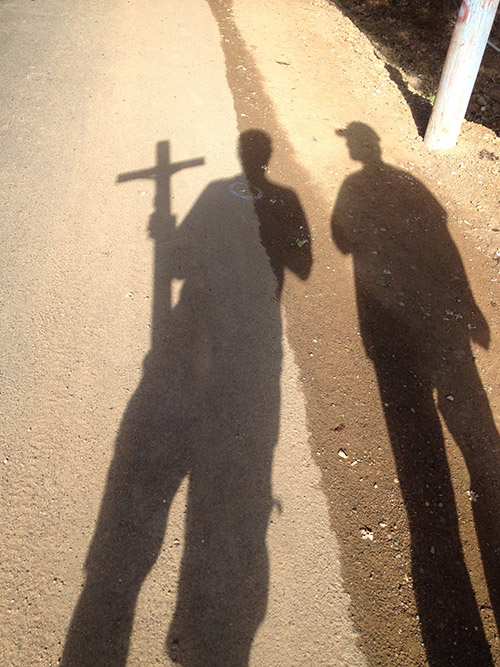 When I arrived here eight years ago, I saw a sleepy, bucolic collection of crumbling buildings and out moded utility systems. It was a struggle to keep generators running ten hours a day to power cast off medical equipment, museum pieces really, that flicked on and off as often as the frayed wires allowed. I saw a steady stream of women and children standing in a circle patiently awaiting their turn at our well spigot to get a bucket of hospital water which they felt was better than their brackish supply. And I remember the stench of an overused latrine which perched itself at the entrance to our OR’s, gagging all who dared breathe in this foul air. But you, our donors were made aware of these and a myriad of other issues and you placed your trust and financial support in us to fix them. And we did.
When I arrived here eight years ago, I saw a sleepy, bucolic collection of crumbling buildings and out moded utility systems. It was a struggle to keep generators running ten hours a day to power cast off medical equipment, museum pieces really, that flicked on and off as often as the frayed wires allowed. I saw a steady stream of women and children standing in a circle patiently awaiting their turn at our well spigot to get a bucket of hospital water which they felt was better than their brackish supply. And I remember the stench of an overused latrine which perched itself at the entrance to our OR’s, gagging all who dared breathe in this foul air. But you, our donors were made aware of these and a myriad of other issues and you placed your trust and financial support in us to fix them. And we did.
Today, we share our chlorinated water supply which bears no harmful pathogens; deliver electricity by modern generators to the hospital by way of a new underground electrical distribution system. And that old latrine is gone and in its place there is a beautiful little garden with a local artisan’s version of the Madonna and child hanging above a handmade tiled backdrop.
We have built scores of new clinic rooms, a new maternity wing with its own OR, a new pharmacy, a new radiology and echocardiograph center and the list goes on.
This was all accomplished through your generosity and with your explicit trust and encouragement. You believed in CRUDEM and that our efforts would succeed, much like my Haitian friends who have placed their trust in us as well.
In the context of the difficult place and circumstance of Haiti, I would say we are doing good work and getting results that you would be proud of.
The often blurry contract between donor and recipient is clear and present in the mission known as Hopitâl Sacré Coeur and for that I am grateful for your support and so are my friends in Milot, Haiti.
God bless you for your charitable giving and keep us all in your prayers as we press on to a brighter future for very deserving people.
